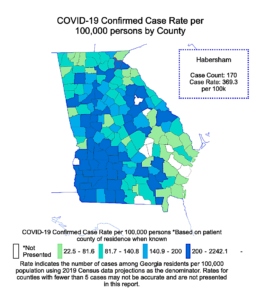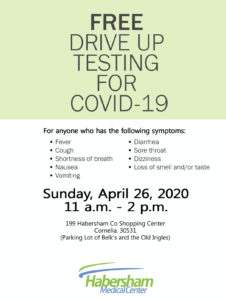
The anticipated coronavirus surge has hit Habersham County hard. In just the past week, the number of COVID-19 cases in the county has more than doubled. Habersham now has the 27th highest number of positive cases in the state.
Sadly, there’s been another death.
The Georgia Department of Public Health reported this week that a 74-year-old man who lived in Habersham died with the virus. He is the third confirmed virus-related death in the county. Earlier this month, two women aged 79 and 40 who tested positive for the virus passed away. All three patients had underlying medical conditions, DPH says.
On April 15, Habersham surpassed Jackson County and seven days later Clarke County to now hold the dubious distinction of having the second-highest number of positive COVID-19 cases in Northeast Georgia. Only Hall County has more with over 1,000 cases.
Increased testing and contact tracing
Part of the steep spike in numbers can be attributed to the fact that more people are being tested. The state expanded its testing criteria on April 15 to include all symptomatic individuals.

DPH updates the total number of positive cases and deaths in the state on its website twice daily. “The total number of cases reflects those who have recovered, those hospitalized, and others who may still be recovering,” says Region 2 DPH spokesperson Dave Palmer.
While the Georgia DPH is the official reporting agency for COVID-19 statistics in the state – all healthcare providers are mandated by law to report cases to them – the agency’s numbers still don’t tell the whole story. Online reports lag behind what healthcare workers are seeing and reporting from the field due to how the information is verified and updated.
A prime example can be seen through information provided by Northeast Georgia Health System (NGHS), the largest health system in the region. While DPH reported 984 cases and 9 deaths in Hall County as of 12 p.m. on April 24, NGHS data for the same timeframe shows 1,094 cases and 11 deaths.
Skeptics argue that the delays in reporting and the inclusion of recovered cases in county and statewide numbers result in over-inflated figures. Quite the contrary explains one of the region’s leading infectious disease doctors.
“Keep in mind, due to challenges that still exist with testing, we are confident that even our latest data doesn’t truly reveal all cases that exist in our community,” says the chair of Northeast Georgia Medical Center’s Infection Prevention & Control Committee Dr. Supriya Mannepalli. “It’s a certainty there are more people with COVID-19 in our region who haven’t been tested and aren’t showing any symptoms.”

According to Palmer the state doesn’t report recovered cases because “At this time our effort is focused on testing and contact tracing.”
The lack of publicly available information about contact tracing has been a point of continuing public concern. That information is not released to the general public due to federal patient privacy laws. Health officials say they understand the public’s interest but must adhere to the law while balancing public health interests.
Georgia DPH operates under the premise that those who need to know will be notified.
“When a confirmed positive case is reported, our epidemiologists contact the person who has tested positive. The person is asked where they have been and who they have had close contact with – 6 feet or less for more than 10 minutes,” Palmer explains. “The people identified by the case as close contacts (family, co-workers, friends, or whoever) are notified and given instructions based on the circumstances of their exposure.”
“not the time to relax”
Although Governor Brian Kemp has eased restrictions on many of the state’s businesses, allowing them to reopen under specific guidelines, medical workers warn that should not be viewed as a sign that everything’s ‘alright.’
NGHS president Carol Burrell says “now is not the time to relax.” COVID-19 still has not peaked in Northeast Georgia, according to medical professionals.
“While I know the economy is important, our crews are transporting patients every day that are positive now, and we see the numbers rising almost daily, sometimes double-digit increases,” says Habersham County Emergency Services Director Chad Black.
Black and other local public health and safety officials urge residents to continue to follow the social distancing, handwashing, and other precautionary guidelines issued by the CDC. If people don’t, Black warns “we will see positives continue to increase, as well as deaths.”
Drive-up testing
In an effort to try and mitigate the COVID-19 surge in Habersham County, Habersham Medical Center (HMC) in Demorest is teaming up with the Georgia Department of Public Health and local community partners to provide free, drive-up testing on Sunday, April 26 in Cornelia.
Habersham County Emergency Services and the sheriff’s office, as well as the Cornelia police and fire departments, are assisting in the effort.
“This is a collaborative effort with so many of our county partners as we all have a vested interest in keeping Habersham healthy,” says HMC spokesperson Kesha Clinkscale.
Clinkscale says they have one primary goal – to stop the spread of the coronavirus in Habersham County. They hope to achieve that by:
1. Identifying individuals who test positive for COVID-19;
2. Getting them the help they need and;
3. Providing information and educational resources to individuals on how to care for themselves and/or their families who may test positive for the virus.
Testing will be available for anyone who has certain symptoms including fever, cough, shortness of breath, loss of smell and/or taste, among others (see list below).
The drive-up test site will be open from 11 a.m.-2 p.m. in the parking lot of Belk’s and the old Ingles in Cornelia off of Hwy. 441 in Cornelia. The address is 199 Habersham County Shopping Center.


Updated 4/25/20@7:55pm






